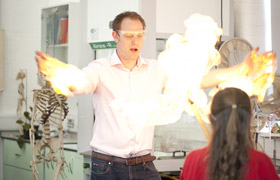Institute of Education hosts unique climate change workshops for school children
Release Date 28 June 2013

The Institute of Education at the University of Reading is welcoming more than 300 school children for an exciting and innovative programme of climate change activities which combine science, maths, history and modern languages.
Over the three week programme, which began on the 3 June, students aged between 9 and 15 are debating, experimenting and interacting to learn about the history of climate change, the main causes, and the overall impacts that climate change might have on them and the wider world.
The activities see children working in teams with coloured balls to simulate the way that carbon moves between atmosphere, ocean and plants in the carbon cycle. Washing up liquid bubbles filled with methane are exploding in a burst of brilliant yellow flame to give a dramatic demonstration of the amount of energy in fossil fuels (all within Health and Safety - of course).
The coupling of the arts and sciences is a particularly unique element of the activities. Groups of children are debating climate change in French, German and Spanish and tracing the history of how water ends up in bottles on our supermarket shelves.
Children are exploring the concepts of heating, cooling and friction by reading Michael Rosen's poem "Granma's hands", a quirky and hilarious mix of science and poetry, as well as science experiments following instructions in French and Spanish. These activities formed part of the Reading Poetry Festival 5-9 June.
The activities are being organised by four trainee teachers under their Further Development Placement which forms an integral part of the postgraduate teacher training offered by the Institute of Education.
Two science and two modern foreign language trainees who have excelled in their previous school placements have teamed up with staff at the Institute of Education to design, deliver and evaluate teaching activities and workshops that help young people understand issues related to climate change.
Jane Fieldsend, Lecturer in Science Education at the Institute of Education and one of the key organisers of the programme, says: "Developing and delivering these activities is providing our trainee teachers with fantastic practical experience that they can take forward through their teaching careers - we're really impressed with what they are achieving over the three weeks."
John Oversby, leader of the EU Changing with the Climate Project, says: "This unique collaboration between outstanding teachers at the start of their careers is a shining example of the kind of creativity and innovation in education that we encourage at the Institute."
Barbara King, Lecturer in Modern Foreign Languages, says: "A unique aspect of these activities is that science and languages are integrated so that the students develop understanding of both subjects through climate change. This provides a fresh and engaging way to approach modern foreign language teaching."
